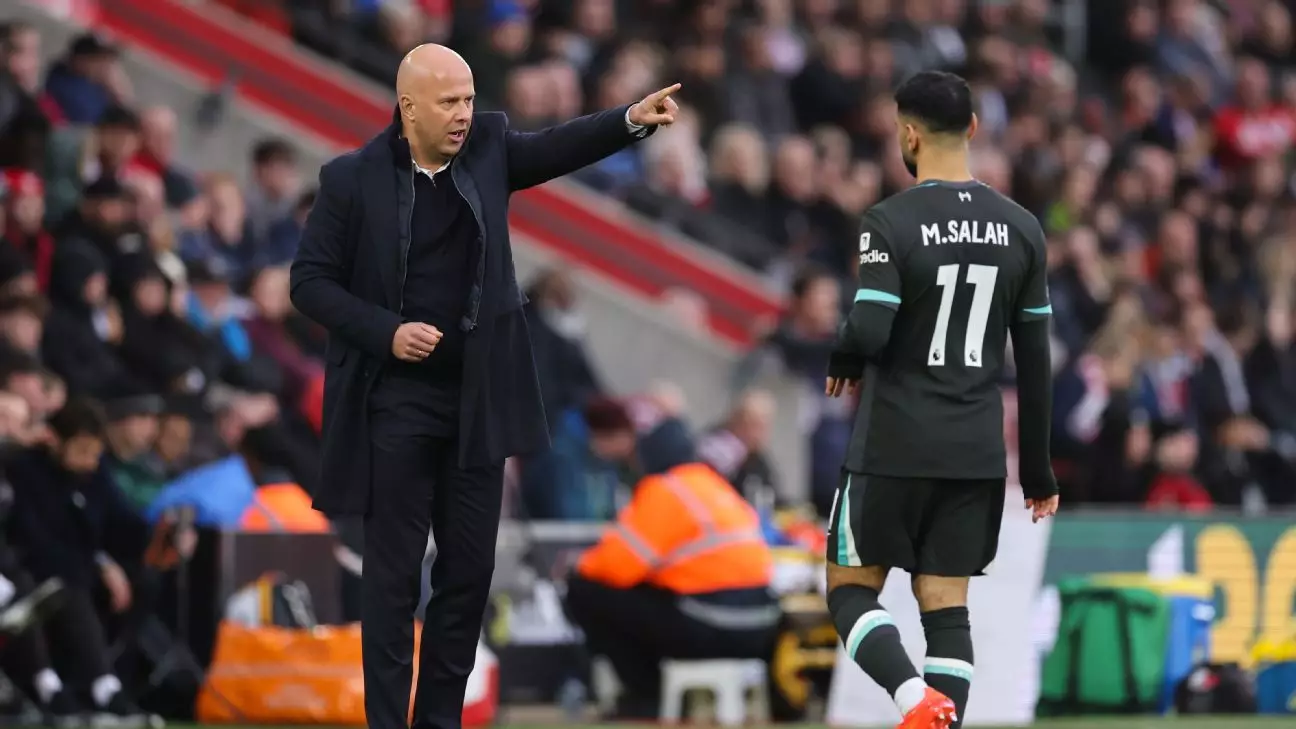In the world of football, contract negotiations often become a focal point of media attention, and Mohamed Salah’s situation at Liverpool is no exception. Recently, Salah’s remarks following his standout performance in a thrilling 3-2 victory over Southampton raised eyebrows among fans and analysts alike. With his contract set to expire next summer, the Egyptian forward’s candid expression of uncertainty about his future has left many questioning his commitment and focus on the team. In his post-match interview, Salah stated, “I’m probably more out than in,” revealing a mix of disappointment and frustration, as he has yet to receive a formal contract offer from the club.
While Salah’s comments may seem alarming to supporters, Liverpool’s manager, Arne Slot, has taken a more optimistic stance. He insists that the player remains dedicated and is not distracted by his contract talks. This raises important questions about the psychological toll that contract negotiations can take on a player’s performance. Acknowledging Salah’s importance to the team both on and off the pitch, Slot defended the forward’s focus, emphasizing that Salah’s commitment has not waned due to external pressures.
Football, often described as a beautiful game, is marred by the incessant scrutiny of media coverage and social commentary. After Salah’s comments, former Liverpool defender Jamie Carragher labelled him “selfish” for voicing concerns over his contractual future publicly. Such statements highlight the difficult balance players must navigate between personal interests and public perception. While players have a right to express their feelings and frustrations, they are often reminded that they represent more than just themselves; they embody the aspirations of a club and its vast fan base.
Slot’s response to Carragher’s criticism illustrates a nuanced understanding of player psychology. He pointed out that Salah’s professed aspirations could very well ignite a competitive fire within him, which ultimately benefits the team. It invites a deeper discussion about how open dialogue can coexist with high-stakes athletics. Should players remain silent about their personal concerns, or does voicing them align with the evolving landscape of player rights and interests in modern football?
Another aspect of Liverpool’s challenges this season is the health of its squad. The club is currently grappling with numerous player injuries, including key figures such as Alisson Becker and Diogo Jota. With Trent Alexander-Arnold also recovering from a hamstring issue, Slot faces the daunting task of preparing for high-stakes matches against formidable opponents like Real Madrid, all while dealing with a reshuffled lineup that lacks its star players.
Injuries not only affect team dynamics and performance but can also amplify existing tensions, such as those surrounding Salah’s contract. An unsettled player in a team struggling with injuries can exacerbate stress within the squad. Therefore, Slot’s ability to manage both the fitness and morale of his players will be paramount in the coming weeks.
As Liverpool prepares for the crucial Champions League clash with Real Madrid, the club stands at a crossroads. Salah’s future, intertwined with the team’s ambitions, must be navigated with care and strategy. The looming question remains whether Salah will receive the contract he seeks, and if so, whether it will come with the assurances he desires regarding the club’s long-term vision.
In a sport that often prioritizes results over individual narratives, the case of Mohamed Salah serves as a reminder of the human element behind the game. Players’ emotions, aspirations, and futures are ever-present, influencing performances and shaping the destiny of clubs. Fans and management alike will be watching closely, hoping that Salah’s focus can remain sharp amidst the distractions—a hope that is crucial not just for him personally, but for Liverpool’s success on the pitch as well.

